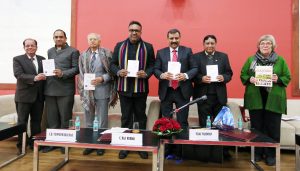Sonipat, Haryana, India: Jindal School of Government and Public Policy and the Open Society Foundations organized a Joint conference on “Reimagining & Reinvigorating Rural India”. The daylong conference was aimed at understanding the current state and challenges of rural governance in India, highlighting innovations and policy approaches from vantage points. Rural Governance and Public Policy, Empowering Rural Citizens and Rural Growth and Development were some of the themes, taking into consideration food insecurity, poverty, lack of employment opportunities, insecure access to credit and financial services, poor infrastructure services, rapid urbanization, internal migration and the dismal state of agriculture, resulting in rural India plunging into a crisis.
Professor C Raj Kumar Vice Chancellor O. P. Jindal Global University and Director Iced (International Institute of Higher Education Research and Capacity Building) called for a more a nuanced understanding of the issues and challenges, not only in rural India but also in other sectors, especially higher education. He announced the university’s collaboration with the Times Higher Education World University Rankings, he said, “I am proud and most delighted to share with you, that the BRICS & Emerging Economies Universities Summit, is being jointly organized by the Times Higher Education (THE), O.P. Jindal Global University (JGU) and the International Institute for Higher Education Research & Capacity Building (IIHEd) to be held in India for the first time during 2-4 December 2015. The Honorable President of India, Shri Pranab Mukherjee, will inaugurate the conference”.
Professor R. Sudarshan, Dean, Jindal School of Government and Public Policy (JSGP) said, “We deeply value our relationship with the Open Society Foundations and are hopeful that this collaboration would help us embark on a variety of joint exercises, wherein we collectively can pursue development goals that are important from the standpoint of people, not merely of interest to governments and administrative institutions.” Dean Sudarshan also announced that JSGP will host in Nov. 2015 a conference of the International Development and Public Policy Alliance (IDPPA), a consortium of nine public policy schools in the BRICS countries and also Egypt and Turkey.
Speaking on how independent social audits have proved to be an effective tool in monitoring government schemes, reviewing how public-sector funds have been spent on the ground, Sowmya Kidambi, Director, Society for Social Audit, Accountability and Transparency, Department of Development, Govt. of Andhra Pradesh said, “In a growing scenario where you have deficit of trust between citizens and government, a concerted effort is required to ensure that citizens are able to reach out to the government and are responded to.
Prof. Shiv Viswanathan, Vice Dean ( Institution Building) and Executive Director, Centre for the Study of Sciences, Society and Sustainability, JSGP spoke of the need to rethink the notion of sustainability. He said, “The urban-rural dichotomy has to be broken down. We misunderstand the innocence of social science. We need an exorcism of concepts as a part of creativity of democracy. My focus is on the relationship between knowledge and democracy.” Referring to the Constitution’s directive principles of state policy as a new imaginary, Prof. Viswanathan said, “When you to rethink the notion of sustainability, the urban rural dichotomy would have to break, to rethink the notion of sustainability, the constitution has to exist in multiple kinds of time, incorporating rights of future generations and the rights of nature.”
Speaking on India’s rural crisis, the opportunities ahead and the developmental challenges faced by the country, Rajeev Malhotra, Professor, JSGP, Executive Director, Centre for Development and Finance highlighted that 91% of the rural population in India is either self-employed or works as casual labour.
Prof. Malhotra , Lead Author & Chief Editor, India Public Policy Report, emphasized that 2/3rd of India’s population earn their sustenance from agriculture, over 70% of Indians live in rural India amounting to over 850 million people residing in villages. At current growth estimates of over 800 million, 45% of India’s population is still expected to reside in rural areas in the year 2050. He said, “We have come a long way from the days of PL-480 and are now a major exporter of numerous food items, though we have a semblance of food security at national level, the notion of household food security is some distance away, the challenge is not only to keep food production in tandem with the growing needs of the population, but to create a diversified food basket that can address the growing need of nutrition security.”
Dr. Suman Sahai, Chairperson, Gene Campaign while speaking at the session on Rural Growth and Development said, “While 70% of our population depends on agriculture and while we are one the largest agrarian economies in the world, we should also remember India is still home to the largest number of hungry and under nourished people in the world.”
Professors Shekhar Singh, Swagato Sarkar, Rajesh Tandon and Dr. Kiran Bhatty critically examined challenges of local governance, land acquisition, causes of farmers’ suicides, and parlous state of primary education in rural India.
OSF Representatives from over 9 different countries, Jindal University faculty, students and external experts had a unique opportunity to gauge the dynamics, challenges and realities of rural India at the conference held at O. P. Jindal Global University.


